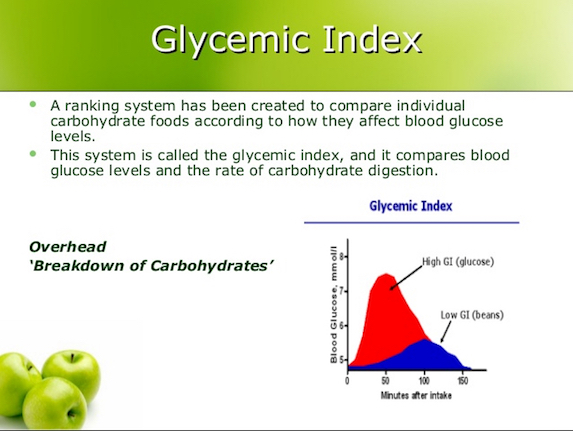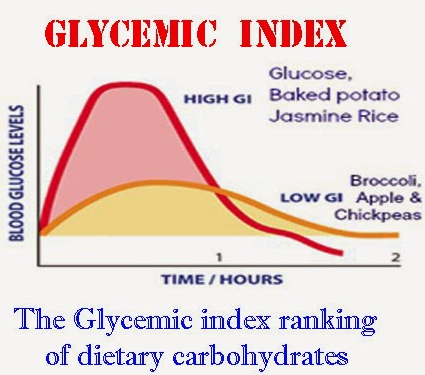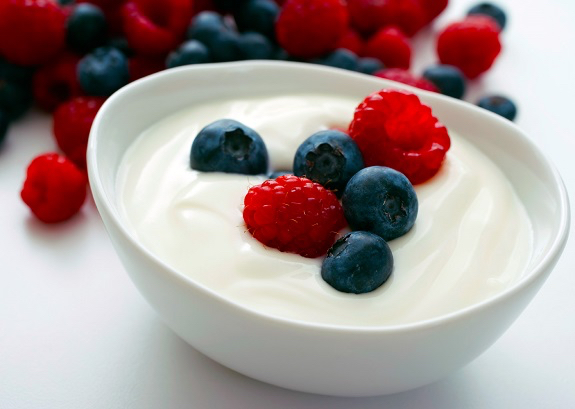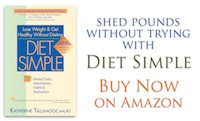Rev-Up Your Immune System Through Nutrition
- At March 11, 2020
- By Katherine
- In Articles, News
 0
0
Check out CNN’s video featuring Katherine’s immune-boosting tips:
What you eat profoundly affects your ability to fight disease. With all the nasty bugs going around this cold and flu season, it’s especially important to pay attention to boosting your immune system through nutrition. While every nutrient is important for your body’s ability to prevent and fight disease – from colds to cancer – certain nutrients play key roles:
Found naturally in yogurt and kefir, probiotics nourish your gastrointestinal tract’s microbiome, that is, its microscopic ecosystem of cells called “microbes.” The health of your microbiome can make – or break – your health in every way. Eating foods high in probiotics (and prebiotics) is the best, if not the only, way to make sure your microbiome is filled with those healthy microbes.
But probiotics can’t work alone. To be effective, you also need foods containing prebiotics, certain high fiber plant foods, to create the good health you desire. Prebiotics nourish probiotics. Together they form the critical prebiotic/probiotic duo creating a microbiome teeming with healthy microbes that achieve the superior level of beneficial microbes that fight off chronic and acute diseases.
While not always, microbes usually live in harmony with their human hosts. They inhabit just about every part of the human body, living on the skin, in the gut, and up the nose. The healthy ones, increased with probiotics, are essential for good health and survival.
But there are dangerous ones, too, that cause disease and death. The typical American diet and lifestyle produce more of the disease-causing microbes. Your health and quality of life suffer dramatically when the unhealthy microbes outnumber the healthy ones. The only way to keep that from happening is to consistently nourish your body the right way so you can be as healthy, happy and energetic as possible.
Your prescription:
DAILY eat yogurt or kefir, in whatever form you like best
Protein
Protein is one of the most important nutrients in the human body, second only to water. Bone health, muscle function, muscle strength, muscle mass and immune function — all are impaired with a low protein intake. In fact, the antibodies which are essential to protecting your body against pathogens, are made of protein, so without enough protein, your body has no chance. Certain vulnerable populations, such as the elderly, children, and those who already have compromised immune systems, should be particularly careful to eat enough protein – in fact, even more than the recommended dietary allowance – for maximized protection.
Protein can be found in a wide range of foods. Animal protein is in seafood, dairy, meat, poultry and eggs. Vegetarian protein can be found in legumes, soy, vegetables and whole grains. And while it’s true that high-protein foods often bring fat and calories along as uninvited guests, it doesn’t have to be that way. The lowest-calorie animal protein sources are the leanest. Go for eggs, seafood, poultry with no skin, skim milk, nonfat or low fat yogurt, and low fat cheeses are also great options. Soy products also provide great low-calorie options and are high quality proteins similar to animal protein.
Protein foods have other benefits. Fish, legumes, seeds, nuts contain immune-boosters zinc and iron (but in too high quantities, for instance in megadose vitamin pills, can backfire and suppress the immune system). Dairy products (keep them fat-free or low fat) are naturally loaded with magnesium, potassium and calcium – all important for immune function. Beans and soy beans are high in iron, zinc and magnesium.
Fats and Oils
The type of fat you eat can improve the effectiveness of your body’s immune response because fat ends up in all of your body’s cell walls. It acts as a cell lubricant, improves flexibility and communication between cells, and is important for cell metabolism and gene expression. If the fat you eat is saturated – solid at room temperature – as in butter or animal fat – this decreases cellular flexibility and functioning. So, to maximize your immune response, use oils in your cooking, such as olive oil (for drizzling), peanut/nut oils (for high heat cooking), and canola oil (for high heat cooking), and stick with foods high in heart-healthy fats, such as nuts, avocados and fatty fish, which is high in omega-3-fatty acids. Minimize animal fats in dairy products, red meats, butter, cream, or too many foods or desserts containing said ingredients. They increase the incidence of cardiovascular disease. Red meats (pork, beef, lamb) also increase the risk of many cancers, particularly when they’re cured.
Vitamins and Minerals
Studies show all nutrients are involved in your immune response but taking high doses of certain nutrients can cause imbalances, backfire, and actually suppress your immune response. So it’s ideal to get your vitamins and minerals from a nutrient-rich, balanced diet. Though you may benefit from taking a basic multi-vitamin and mineral supplement to cover your bases. And there may be some exceptions depending on your own nutritional status (best to get personalized advice from your dietitian and doctor)…
Vitamin D
New research has found Vitamin D augments the body’s ability to eliminate disease-infecting microbes, and most of us are deficient in Vitamin D, which we get from the sun and very few foods. Your doctor should check your vitamin D status at your next visit to make sure your blood values are adequate to fight infection, among other things. That said, most of us need a vitamin supplement with vitamin D, usually somewhere between 1,000 and 4,000 IU/day. But check your blood values first. They should be somewhere between 50 and 75 for most people. Check out my “Vitamin D” article for more details…
For Those Over 50
Vitamin E
Studies from Tufts University found that vitamin E supplementation may help fight the common cold and other upper respiratory tract infections. The recommendation is about 400 IU/day
Zinc
Zinc helps fuel the production of infection-fighting white blood cells so a lack of zinc reduces immune response and illness recovery time is prolonged. The elderly are particularly vulnerable to deficiencies and may even need more than normal. So here’s another case where a supplement may be useful. When zinc supplements were given in a nursing home, residents reduced their risk of contracting pneumonia, according to researchers from the Jean Mayer USDA Human Nutrition Research Center on Aging at Tufts University.
Vitamin B 12
Vitamin B 12, another nutrient important for immune function, is poorly absorbed in many elderly patients (and is missing from the diet of vegans) which is why your vitamin B 12 status should be checked by your doctor and you may need a supplement – in the form of an injection. For most of us, though, B 12 is easily obtained and absorbed by eating any animal products.
The following is a list of foods containing key immune-boosting nutrients.
Include them in your diet every day:
High Beta Carotene Foods
Orange and deep green veggies and fruits, particularly…Carrot juice, carrots, butternut squash, pumpkin (or any orange-colored winter squash), sweet potato, greens such as spinach, collards, kale, turnip greens, beet greens, orange melons such as cantaloupe, red peppers, apricots, broccoli, plums, mangos papayas, plantains, Brussels sprouts, watermelon, asparagus
High Vitamin C Foods
Citrus fruits such as orange, lemons and grapefruit, peaches, sweet and hot peppers, papayas, pineapple, strawberries, broccoli,kiwi fruit, sweet potatoes, Brussels sprouts, kohlrabi,
High Zinc Foods
Oysters, lobster, crab, clams, fortified whole grain cereals, beans (legumes such as lentils, chick peas, black-eyed peas, soy beans, kidney beans, limas, pintos), turkey, whole grains such as buckwheat, whole wheat, cracked wheat (bulgur), oats, whole grain cornmeal, wild rice, yogurt, pine nuts, sunflower seeds, mixed nuts, peanuts
High Magnesium Foods
Whole grains such as buckwheat, wheat, oats, cornmeal, barley, brown rice, Also soybeans, pumpkin seeds, brazil nuts, cashews, greens such as spinach, beet greens, fish such as halibut, haddock and flounder and sole species, beans (legumes such as black beans, white beans, soy beans, navy beans, limas, black-eyed, great northern, kidney, chick peas,. lentils)
High Vitamin E Foods
Sunflower seeds, almonds, sunflower oil, safflower oil, canola oil, hazelnuts, pine nuts, spinach, turnip greens, beet greens, dandelion greens, canned pumpkin, carrot juice, broccoli, sweet potato, sweet red peppers, mangos, papayas
Cranberries
Have antibacterial qualities. Eat them dried for the highest levels of nutritious compounds
Have a myriad of beneficial health effects. They’ve been shown to boost the immune system, especially in relation to cancer. Called a “drug-botanical interaction,” mushrooms appear to increase the effects of chemotherapy, and lengthen survival.
Mushrooms also reduce fatigue.They act on the muscular system, body antioxidant system, cardiovascular system, hormone system, and immune system, all of which improve liver function, blood circulation, and blood glucose regulation, among other benefits.
Immune-Boosting Eating Strategies
* Eat a lean protein source at every meal – including breakfast, lunch and dinner. 20 grams for women and 30 grams for men is the amount most bio-available per sitting.
* Eat 5 cups of fruits and veggies per day – especially colorful varieties, eat at every meal and snack
* Eat a vegetarian meal every day using beans or soy beans for protein,
* Eat fish high in omega-3-fatty acids, such as salmon, herring, anchovies and sardines, at least two to four times per week, and vegetarian sources such as walnuts, ground flax seeds and canola oil,
* Use canola oil in your cooking and a fresh, newly harvested olive oil for drizzling,
* Eat whole grains at breakfast (such as cereal with skim milk or soy milk) and with sandwiches or wraps at lunch,
* Snacks: Try fat-free yogurt and fruit, fat-free yogurt dip or hummus with veggies,
* Toss nuts/seeds/dried cranberries in your whole grain cereal, your salad or your afternoon yogurt snack
* Skim milk or Soy lattes or teas are great snacks, too…
* Take a multivitamin-mineral supplement daily.
* Take a Vitamin D Supplement so that you are getting 1,000 to 2,000 IU/day
* If you are over 50, but particularly 65, look into supplementing your diet with Vitamin E, Vitamin B12, Zinc and probiotics such as lactobacillus in yogurt.
Of course, don’t forget to keep your blood moving by being moderately physically active with plenty of walking, yoga, etc. Get plenty of rest, wash your hands frequently, drink fluids (especially warm fluids which will send light steam into your nasal passages) and spend time with friends and loved ones. Studies have shown these habits increase your ability to conquer diseases – from colds to cancer.
13 Surprising, Simple & Powerful “Foods As Medicine” You Should Try
- At March 21, 2018
- By Katherine
- In Articles, News
 0
0

A responsibility I take very seriously – and one I avidly enjoy – is discovering the best nutrition therapy, or “Foods as Medicine,” for each of my clients’ unique life enhancing, healing needs, and even for improving some rare conditions. Over the years, I’ve come across some very simple, strange, and powerful solutions which have been successful and ones from which you might benefit.
Tea for increasing bone and muscle strength: Studies are finding that regular tea drinking may reduce age-related inflammation and oxidation causing muscle and bone breakdown resulting in increased bone mass and muscular strength.
Green Tea for speedier weight loss: Certain compounds in tea, and especially green tea, have been found to burn body fat. Caffeine slightly increases fat-burning, but the combination of caffeine and green tea catechins [a type of flavonoid] is even more effective.
Chocolate improves erectile dysfunction: The flavanols in cocoa help maintain a healthy vascular system, relax blood vessels, reduce blood clotting, oxidative damage, and improve blood flow – to every part of the body.
Chocolate reduces wrinkles: After drinking cocoa for 24 weeks, women experienced reduced wrinkles and increased skin elasticity, reducing the effects of sun damage and aging.
Mushrooms boost the immune system, improving diseases from colds to cancer. Used medicinally since at least 3,000 BCE, mushrooms appear to increase the effects of chemotherapy, and lengthen survival of cancer patients. Mushrooms, considered “pre-biotics,” enhance the digestive tract’s healthy bacteria, the “microbiome,” thus providing your body with extra disease-fighting properties.
Mushrooms reduce fatigue: They act on the muscular system, the body antioxidant system, cardiovascular system, hormone system, and immune system, all of which improve liver function, blood circulation, and blood glucose regulation, among other benefits.
Tart cherries (dried or concentrated) and tart cherry juice reduce pain from gout and neuropathy, improve muscle recovery after intense exercise, and enhance sleep quality: Scientists hypothesize that the presence of hundreds of compounds – especially anthocyanins – in cherries are responsible for the benefits. But there are probably as yet undiscovered properties which contribute to their health strengthening qualities.
Hydrolyzed Collagen reverses the pain of arthritis, the aging of joints, bones, muscles, skin, and reduces cellulite. Collagen is the most abundant protein in the animal kingdom important for joints, bones and skin. Taken as a supplement, collagen needs to be “hydrolyzed” into tinier molecules called “collagen peptides” so it can effectively enter your body’s cells and your body can utilize it.
Coffee extends exercise performance: Once banned by the International Olympic Committee, caffeine stimulates the neuromuscular system to increase your body’s ability to exercise longer, with less fatigue, than it would absent caffeine.
Yogurt reduces body fat: The probiotic cultures in yogurt have been found to prevent insulin resistance, diabetes, and body fat. People who eat yogurt are leaner than those who eschew.
Egg yolks reduce cataracts and macular degeneration, the leading cause of blindness: Egg yolks contain compounds called lutein and zeaxanthin, also found in deep leafy greens. But they’re more powerful in egg yolks because lutein and zeaxanthin need to be eaten with fat, found in egg yolks (but not in greens), to be effective.
Beans clear acne and improve skin: There is strong evidence that a diet with foods causing the lowest blood sugar responses (a low glycemic diet) may be the best solution for clear skin. Beans are not only nutritious, but are very low on the glycemic index scale.
Extra Virgin Olive Oil – but ONLY when newly harvested – reduces metabolic syndrome: The nutrients in olive oil, polyphenols, responsible for its superior health benefits, disappear with time, light, and heat exposure. But when high in polyphenols, for instance, the first six months after harvest, EVOO “turns on” several genes which lower blood glucose, blood cholesterol and blood pressure,
Salmon reduces Alzheimer’s Disease (AD): Studies show inflammation is a major cause of AD and cognitive decline. Omega-3-Fatty Acids, which salmon contains in abundance, have proven abilities to reduce inflammation.
Nuts for weight loss: Even though nuts are quite caloric, people eating nuts are more likely to have lower body weights. Nuts are satiating; they make us feel full. Adding nuts to meals, especially breakfast, decreases overall calorie intake, making weight loss easier.
Potatoes have sustained many cultures for thousands of years. Think Russia, Scandinavia, Ireland, South America. Without potatoes, Vitamin C deficiency would have flourished. Especially in northern climates where citrus fruit and many other high vitamin C fruits and vegetables cannot be grown. They have an undeserved bad rap! They’re filled with fiber, potassium, Vitamin B-6, some iron, and – believe it or not – they are low calorie for a starchy food, only 110 calories for 5.3 ounces. Eaten plain, the concern is real, though. as they raise blood glucose quite high. But eaten with fat such as when they are sautéd or roasted in oil, eaten with a proten, such as salmon or chicken, even Greek yogurt instead of sour cream, as they would be in a meal, those foods will lower the blood sugar response (glycemic index) to much lower levels.
Enjoy!
Why Is Eating Yogurt Daily – and Your Gut’s Health – Creating a Health Care Revolution?
- At February 12, 2018
- By Katherine
- In Articles, News
 1
1
Possibly the most significant nutrition discovery in decades is all about your gut, and it can make or break your health, in ways that are shocking. I’m not exaggerating when I say that it has caused a health care revolution. A healthy gut affects every organ in your body – from your brain to your toes – and, for a variety of reasons, most Americans (and that could be you) have an unhealthy gut, one that causes disease and distress. I believe eating yogurt daily is one of the only methods, and certainly the easiest one, we can use to make up for the healthy gut we abused and lost while growing up and now as adults. Why is this critical for your future and your health, as well as the health of your children, friends, relatives, and your elderly parents?
For years, I’ve wondered why people who regularly ate this versatile food seemed more likely to enjoy superior health, fight off illness more effectively, lose body fat more easily – while keeping, and even increasing muscle, seemed more alive, energetic and happy (and even if those benefits were a figment of my imagination). Thankfully, scientific research is now backing my observations of 25+ years. This has been a remarkable nutrition discovery. We always knew the microbiome (the 100 million cells in your gastrointestinal tract) was important, but the new studies show the effects of a healthy or unhealthy microbiome are vast, more than we ever could have imagined. The tired, old saying, “You are what you eat,” Is truer than we ever realized!
The health of your microbiome starts in utero, continues at birth, and in infancy. If you were breastfed, you have many health advantages. For instance, you are less likely to be obese or have diabetes later in life. That’s because breast milk is filled with healthy microbes, called probiotics (and prebiotics, which I’ll discuss later), which boost your immune system. They also decrease insulin resistance, thus lowering your blood sugar and insulin levels. Insulin is a “growth factor” which, when too high, is correlated with heart attack, colon cancer, and other cancers, and is a precurser to diabetes. It is also associated with increased inflammation, a risk factor for diseases from the cold, to arthritis, even mental health and risk for cognitive decline and Alzheimer’s.
One cause leading to an unhealthy microbiome in developed countries, is a diet composed of low fiber, refined foods, and a dearth of whole grains, fruits and vegetables. You need these high fiber foods (called prebiotics) to nourish the probiotics, and together in the GI tract they form the critical prebiotic/probiotic duo creating a microbiome teeming with healthy microbes that fight off chronic and acute diseases.
One study found when children are given a high level of antibiotics, they experience more obesity, diabetes and infections later in life when compared with children who received less antibiotic therapy. Of course, antibiotics save lives! But they not only destroy bad, disease-causing bacteria, they also destroy the healthy microbes/bacteria. Scientists are working on finding a balance that would make antibiotics kinder to the good microbes which kill off disease naturally.
It seems the healthiest microbiomes start in infancy, and once that window is closed, it may be very hard, if not impossible, to make up for it as adults. As you age, healthy gut microbes decrease, but when you’re elderly particularly, you are more prone to disease-causing microbes such as Salmonella and E-Coli, making the need for a healthy microbiome more important than ever.
As of yet, there is no test to measure your gut microbes, or the health of your microbiome. We don’t even know everything that we need to be looking for! The gastrointestinal tract is still quite mysterious and idiosyncratic. I work with many clients with GI issues, and their solutions vary widely.
That’s why I believe foods such as yogurt, which contain natural probiotics, are critical to your health. I push all my clients to eat yogurt daily, and I do as well. When someone tells me they don’t like it, I insist they try every flavor or type imaginable until they find one they enjoy. There are even yogurts that are more like desserts, so I encourage people to enjoy those if those are the only yogurts they find delicious (yes, deliciousness is important!). Plain Greek yogurt can be used in place of sour cream in recipes. I used it on my Swedish waffles (picture above), along with fruit, and it’s a delight!
A Lethal, Cancer-Causing Bacteria Killed by Yogurt and Kefir
- At August 07, 2016
- By Katherine
- In Articles, News
 0
0
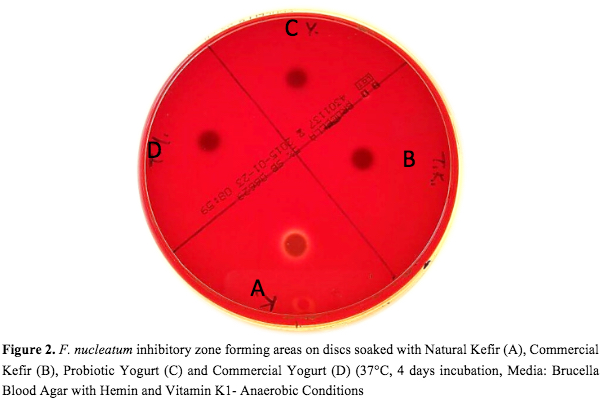
Inhibition of F. nucleatum by natural kefir, probiotic yogurt, commercial yogurt and commercial kefir samples
You’ve all heard about the health benefits of the probiotic bacteria found in yogurt and other similar fermented dairy products such as kefir. This recently published study provides more evidence of yogurt cultures’ actions against serious disease-causing pathogens, such as Fusobacterium nucleatum.
F. nucleatum can cause diseases in the mouth, teeth, brain, pleura, lungs and liver. It induces fetal death in pregnant women and can lead to colon cancer by binding to the lining of the gastrointestinal tract, according to a recent study in the journal, Functional Foods in Health and Disease.
In this study, when yogurt and kefir were added to a petri dish filled with F. nucleatum and incubated for 3 days, there appeared clear zones where the yogurt and kefir were placed. Thus showing inhibition of the growth of F. nucleatum. Interestingly, the plain milk used for the yogurt and kefir did not show an inhibitory effect, but the higher the concentration of the kefir and yogurt probiotic bacteria, the more F. nucleatum’s growth was inhibited.
“Previous studies have indicated that fermented dairy products can cause probiotic effects such as improvement in digestive system health, serum cholesterol reduction, and improvement in lactose tolerance, improved immune function, control of irritable bowel symptoms, as well as anticarcinogenic properties. Kefir is known to have positive effects on health and especially intestinal health. Therefore, these findings are important for showing an inhibition effect of fermented dairy products against a pathogen and possible carcinogen. These results suggest that regular consumption of natural fermented dairy products especially kefirshould be included in a functional diet. The impact of these cultured dairy products could be promising and warrants further investigation with in vivo studies,” according to the authors of the study.
New Study: The Glycemic Index of Foods Varies From Person to Person
- At December 27, 2015
- By Katherine
- In Articles, News
 0
0
The “Glycemic Index” may not be so cut-and-dry. What’s healthy for other people may not be healthy for you!
We all have friends who, no matter what they eat, stay skinny. But the opposite is more common: most of us are incredibly frustrated because, it seems, no matter how hard we try, we just cannot lose weight. Now we may understand at least one reason why.
A study published in the journal, Cell, in November, analyzed people’s glycemic (blood glucose) response, or blood sugar’s rise and fall after a meal. Controlling blood sugar is important for preventing and controlling diabetes, maintaining a healthy weight, and general all-around health. What you eat affects your blood sugar, insulin, and health levels, so a healthy diet containing mostly low glycemic index foods has been thought to be one way to control your health.
Some of the study’s results were typical and expected; glucose levels correlated with weight and age. The more overweight or older we are, the higher our blood sugar rises after meals – that is, we become more diabetic-like.
But the scientists also found important differences between individuals. First, and this was predictable: if the same person ate the same meal at different times, their blood sugar level responses remained relatively the same. But – and this was the unpredictable result of the study – different people eating the same meal at the same time produced highly variable results.
Researchers believe the differences might be explained by the quality of the gut microbiome, the understanding of which may revolutionize nutrition and health. It turns out that the bacterial organisms in the digestive tract — about 100 million of them (10 times the number of human cells), collectively called the microbiome — are akin to a fully functioning organ, and can have a positive or negative effect on human health. For instance, a healthy microbiome improves insulin sensitivity – reducing your chances of getting diabetes – and enhances your ability to lose body fat.
This – the quality of your microbiome, for instance – calls into question things like the glycemic index (GI), which assigns a food’s value based on peoples’ average glycemic response to a food. That’s because, if each person’s blood sugar responds differently at different times with different foods, then the GI index would be incorrect for people with different-than-average blood sugar responses, even for foods generally believed to be healthy.
There is some good news, though! The researchers used the data to create an algorithm that predicted the glycemic response of the participants. When they used this data to tailor diets for people, they saw improved blood sugar responses. These findings could be used to develop personalized and individual diets that don’t rely on averages. This just may crack the case for those having difficulty getting fit.
This is why I find it so important to PERSONALIZE your diet. One size doesn’t fit all!
Yogurt’s Vast Array of Health Benefits
- At November 16, 2015
- By Katherine
- In Articles, News
 0
0
Yogurt has long been considered a healthy option, as it’s packed with protein, calcium, potassium and other nutrients. It’s a great way to get probiotics, which are important for improving digestive health; but also a vast array of health conditions.
Yogurt consumption has been shown to improve bone health (eating yogurt lead to better bone mineral density) and cardiovascular health (yogurt-eaters were 31% less likely to develop high blood pressure), lower one’s risk of getting Type 2 diabetes, and be a useful tool in weight management.
Many of these benefits come from the probiotics found in yogurt, which are associated with a myriad health improvements. Evidence shows that probiotics could help prevent Type 2 diabetes by preventing insulin resistance and allowing your body to more readily burn body fat. But probiotic benefits may go beyond that. Some studies have even shown that probiotics led to improvements in immune functions in HIV-infected patients.
The research is clear: yogurt is a great addition to any diet, particularly if you want to improve your immune response and powers of healing, bone, heart, gastrointestinal health or improve your weight. Pick some up today! I believe any type will do… as long as you eat at least one or two cups per day.
Katherine on “The Daily Show with Jon Stewart”
- At March 17, 2012
- By Katherine
- In Articles, News
 13
13
Milk: “It Does A Body Bad?” … Ed Helms Reports!
The Daily Show’s Ed Helms (“The Office”) Investigates Weapons of Mass Destruction you may be harboring in YOUR OWN REFRIGERATOR!
Harvard Study Finds Certain Foods – NOT Calories – Have a Strong Impact on Weight Gains and Losses
- At June 29, 2011
- By Katherine
- In Articles, News
 7
7
Individual foods are more important than calories when it comes to long term weight gains or losses, according to the study. Specifically, potatoes are associated with weight gain, along with sugar-sweetened beverages and meats, while foods like fruits, vegetables, whole grains, nuts and yogurt, are associated with weight loss, according to the study.
“Modest changes in specific foods and beverages, physical activity,TV-watching, and sleep duration were strongly linked with long-term weight gain. Changes in diet, in particular, had the strongest associations with differences in weight gain… The idea that there are no ‘good’ or ‘bad’ foods is a myth that needs to be debunked,” said a researcher in a press release. The study appears in the June 23, 2011, issue of the New England Journal of Medicine.
When I was contacted by USA Today reporter, Oliver St. John, to comment on the Harvard Study, this gave me an opportunity to look over the study so that I could offer an analysis which would help not only “USA Today” readers, but me and my clients better understand it.
I found some of the claims made regarding the study incomplete.
While this is an interesting study and confirms much of what we know about healthy and unhealthy foods, I’m concerned about the sweeping conclusions for the following reasons:
The Harvard study is epidemiological, the kind of study which analyzes large populations and their health outcomes. Because the facts cannot be precisely measured, as it would be in a clinical study -nobody is weighing and measuring the foods people are eating, their body weights, or their lifestyle patterns – the conclusions which can be made are limited. This is true for many reasons. First, there are no “controls” in the study; making it difficult to tease out confounding variables having an effect beyond the particular foods being studied. What I mean is: eating certain foods is associated with specific behavior patterns, so it’s impossible to determine if the effect (weight loss/gain) is due to the food or the behavior pattern. For instance, studies of whole-grain eating find it is a “marker” for engaging in many healthy behaviors. People who eat whole grains are more likely to exercise and eat more vegetables. SO when epidemiological studies find whole grain- eaters are healthier, one must ask: is the effect due to eating whole grains or the lifestyle associated with eating whole grains? The only way to answer this question is, once the epidemiological data is observed, to take the observations into a lab and do a controlled clinical study. The clinical study would need to control for everything – exercise, diet, body weight, etc – and change only whether people are eating refined or whole grains, to determine if the health effect is due to the whole grain eating or the lifestyle.
POTATOES
The Harvard study found potato-eating associated with weight gain. The researchers warned against eating potatoes, attributing the weight gain to the rise in blood sugar caused by potatoes.
I am not quite convinced. Why?
First, many foods cause rises in blood sugar – including whole wheat bread and whole grain cold cereals. But they aren’t associated with weight gain, in fact, quite the opposite.
Second, in America, most potatoes are eaten as french fries or potato chips, and these are very fattening versions of potatoes. So, the way potatoes are cooked – not the potato itself – may be why Harvard’s epidemiological study found potato-eating is associated with weight gain. This argument points to excess calories as a factor.
Also, and this may be an important factor explaining why potatoes are associated with weight gain. When people eat french fries, they are usually eating hamburgers and hot dogs alongside. Not only that, the beverage they’re drinking is SODA (a known contributor to obesity in adults and children). Therefore, instead of the potatoes causing the problem, could it be the meal pattern or high calorie lifestyle associated with people who eat french fried potatoes? In the United States, french fries are eaten together with fattening, unhealthy foods, known to be correlated with increased weight, diabetes, heart disease, you name it. Same with potato chips. People who regularly eat french fries, potato chips, and sodas also eat other fattening and unhealthy foods. In fact, studies show soda-drinking, for instance, is another “marker” but this time, for engaging in unhealthy behaviors like smoking and being sedentary. These confounding variables could influence the study’s results.
This brings me to the last piece of evidence – and what convinces me the most – that potatoes do not a cause weight gain: SWEDEN
In Sweden, people are no fatter than Americans, in fact, they’re slimmer. But, they eat potatoes every day, and often more than once a day. But when Swedes eat potatoes (and I’m sure of this as I am a Swede and visit often), they eat them in small portions, they’re boiled, topped with a little butter (oops), alongside FISH. Not burgers, not fried fish, just grilled, steamed, cured, smoked, or sauteed FISH.
So, if eating potatoes in Sweden is not associated with weight gain, could it be because the potatoes are cooked in a healthier way than in the United States and the meal pattern is a healthier one? 1) the potatoes are boiled, not fried, 2) the potatoes are eaten in smaller, more reasonable portions, and 3) the potatoes are more often eaten together with other healthy foods, such as fish – not burgers and sodas.
And, how do you explain all those poor, skinny Irish and Russians – heck, anyone living in the northern parts of the world – people who subsisted on and depended on potatoes as their only vegetable for centuries. Why didn’t the potatoes make them fat?
Do I believe potatoes are a wonder food? No. But I also do not believe potatoes are “POISON,” as some commentators have stated.
Should you be eating larger portions of watery vegetables and smaller portions of starchy vegetables, such as potatoes? Yes.
Do I occasionally enjoy French Fries and Potato Chips, known to be fattening, unhealthy foods? Yes I do.
Do I eat French Fries and Potato Chips on a regular basis? No, I do not. Do I wish I could?
Yes I do, but I’d rather be healthy and slim.
NUTS
 People eating nuts were more likely to have lower body weights, according to the Harvard Study. Their explanation is that nuts are satiating; they make us feel full, inferring that they lead to eating fewer calories overall. Clinical studies have found years ago that adding nuts to meals, especially breakfast, decreased overall calorie intake, making weight loss easier. This is one reason why I have been encouraging nut-eating for many years. Also, we’ve known for quite a while that nut-eaters around the world have fewer heart attacks and are healthier in other ways.
People eating nuts were more likely to have lower body weights, according to the Harvard Study. Their explanation is that nuts are satiating; they make us feel full, inferring that they lead to eating fewer calories overall. Clinical studies have found years ago that adding nuts to meals, especially breakfast, decreased overall calorie intake, making weight loss easier. This is one reason why I have been encouraging nut-eating for many years. Also, we’ve known for quite a while that nut-eaters around the world have fewer heart attacks and are healthier in other ways.
Does this mean you cannot gain weight eating too many nuts? No. Plenty of people eat too many nuts and can become overweight because of it. Nuts are healthy, but fattening little morsels. One ounce, or a small handful, contains about 180 calories. This is why I recommend most people eat one ounce per day. But if weight is not an issue, two ounces a day – or more, if you can afford the calories, is fine – and is even heart healthy. When I work with people wanting to gain weight healthfully, I advise snacking on nuts!
Are certain nuts better than others? I’m not convinced of this. Every time a new study comes out about a nut – any nut – it’s positive news. Certain nuts, though, are more commonly eaten, have a bigger consumer base, and more money to fund scientific studies. This may be why you hear about some nuts over others. It is also a very expensive and time-consuming process for a food to be approved for a health claim on a food label. So, only certain nut growers can afford to put health claims on their labels, and educate you about their health benefits.
While you already know each nut has a different look and flavor, each nut also has its own unique nutritional characteristics. For instance, almonds are the highest in protein and Vitamin E, and the lowest in artery-clogging saturated fat. Walnuts are the only nut with omega-3-fatty acids. Pecans have the highest antioxidant content. Pistachios contain lutein, a compound which may significantly improve eye health.
Bottom Line: Eat nuts every day.
They’re good for you and may help you eat fewer overall calories because they’re so satiating!
Yes, calories matter: So, stick with just one or two ounces, if weight is an issue. If not, eat more.
YOGURT
The study found yogurt-eating associated with lower body weights. Whole civilizations have known about yogurt’s health benefits for thousands of years.
When my mother was recovering from hip replacement surgery I advised her to live on yogurt, fruits and vegetables for healing AND to prevent weight gain from being immobile. It worked. She healed very quickly and lost a little weight at the same time. She was thrilled. I’ve repeated the same advice to my clients, when appropriate, and they’ve been thrilled with the results, too.
Yogurt has many positive qualities. I’m convinced: Yogurt is a Superfood; it may be one of the best overall foods you can eat. Yogurt creates a natural way to boost your immune system by providing probiotics which increase the healthy bacteria in your gastrointestinal tract, according to my friend and colleague, Jo Ann Hattner, MPH, RD, in her book, “Gut Insight.”
Probiotics are live bacteria that promote digestive health. As we age, it is thought that bacterial populations in our gut change – resulting in increased harmful, disease-causing bacteria and fewer protective bacteria. When you add probiotics you repopulate the gut with beneficial bacteria that protect against infection-causing toxins.
You also improve colon health by lowering pH of the colon, so it’s receptive to the beneficial bacteria and detrimental to the disease-causing bacteria, you protect the intestinal lining, and strengthen immunity. Exciting research is evolving on the health benefits of probiotics.
But correlating yogurt with lower body weights is complicated. Do you believe people who regularly eat french fries, potato chips, burgers and sodas eat much yogurt? I don’t think so. This is another case where lifestyle probably plays a huge role and why Harvard’s epidemiological study found yogurt was associated with lower body weights.
While it may be true that yogurt has health benefits causing leanness, this hasn’t been proven conclusively in clinical studies yet. There have been studies showing dairy foods are very satiating… That is, when you eat yogurt, you feel full in relation to the calories. And when you feel extra satiated by something, such as yogurt or nuts, it helps you eat fewer overall calories for the day. There is some evidence that the protein in yogurt may be especially high quality, spare lean muscle (and bone), and increase metabolism, thereby making weight loss a little easier. Diary products may also contain other bioactive compounds contributing to leanness. The Harvard researchers speculated the probiotics in yogurt may be responsible for the weight benefit. All of these reasons could be significant. But, the most significant factor probably is: Yogurt-eaters are more likely to live a healthy lifestyle, exercise, and eat other healthy foods.
My clients, family and friends have known this for years. Why? I love keeping up with the science and keep myself and them informed.


